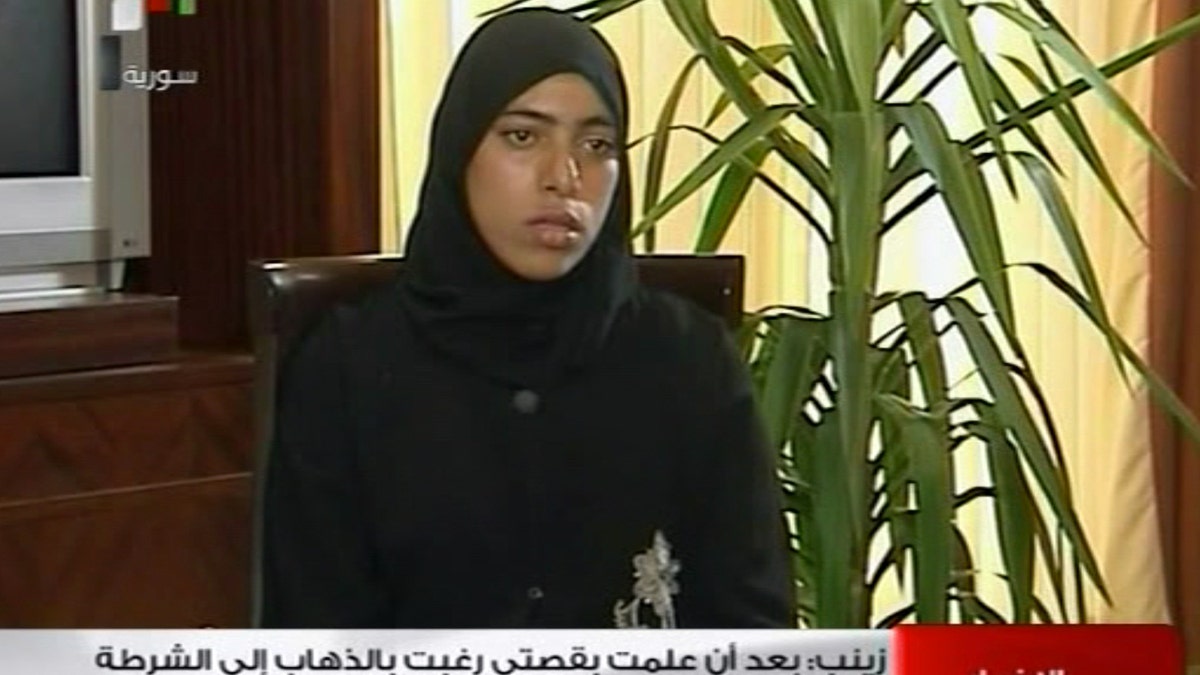Syrian TV Airs Interview With Woman Reported Dead
{{#rendered}} {{/rendered}}
October 5: Pictured is an 18-year old Syrian woman, Zainab al-Hosni, who claims to be the woman who was previously reported to have been beheaded and mutilated by Syrian security agents while in custody in her hometown of Homs. (AP)
A young Syrian woman who was widely reported to have been beheaded and mutilated by security agents while in custody turned up on Syrian state TV on Wednesday in an interview designed to discount what the channel said were foreign "media fabrications."
International human rights groups and Syrian activists reported last month that 18-year-old Zainab al-Hosni was found dead and mutilated after her detention.
Rights activists said she was the first woman to die in Syrian custody since the uprising against Syrian President Bashar Assad began in mid-March, underscoring what witnesses and the U.N. human rights office said was a fearsome new tactic of retaliating against protesters' families.
{{#rendered}} {{/rendered}}But on Wednesday, Syrian TV showed a black-clad young woman who identified herself as 18-year-old Zainab al-Hosni from Homs. The woman said she had run away from her family home in late July because her brothers allegedly abused her.
The woman in the broadcast said she decided to speak out after hearing on TV that she had been arrested and beheaded.
She said her family did not know that she was alive and she asked her mother for forgiveness.
{{#rendered}} {{/rendered}}"I am very much alive and I have opted to tell the truth because I am planning to get married in the future and have kids who I want to be registered," she said.
"We have seen the reports that have aired on Syria TV suggesting that Zainab al-Hosni is alive. We are currently looking into this case working with trusted sources in the country," Amnesty said in a statement.
Last month, Amnesty said the mutilated teenager had reportedly been detained by security agents to pressure her activist brother to turn himself in.
{{#rendered}} {{/rendered}}Al-Hosni's native central city of Homs is one of the hotbeds of the uprising. She was reported seized by men in plainclothes on July 27, apparently to pressure her brother Mohammed, who was organizing protests in Homs, according to Amnesty.
The London-based group had also said al-Hosni's mother found her body in the morgue in September and, according to the family, she had been decapitated and her body badly mutilated.
The young woman quickly became another symbol of the Syrian uprising, with protesters in Homs hailing her as the "flower of Syria."
{{#rendered}} {{/rendered}}Syrian authorities blame the unrest in the country on armed gangs and extremists and accuses some Arab TV channels of broadcasting false news to ignite protests and stir anti-government emotions.
State media allots much of its time and resources to discounting what it says are foreign media fabrications and lies. There are no independent or pro-opposition media outlets in Syria.
The Syrian government has banned foreign journalists and placed heavy restrictions on local coverage, making it difficult to independently verify events on the ground.
